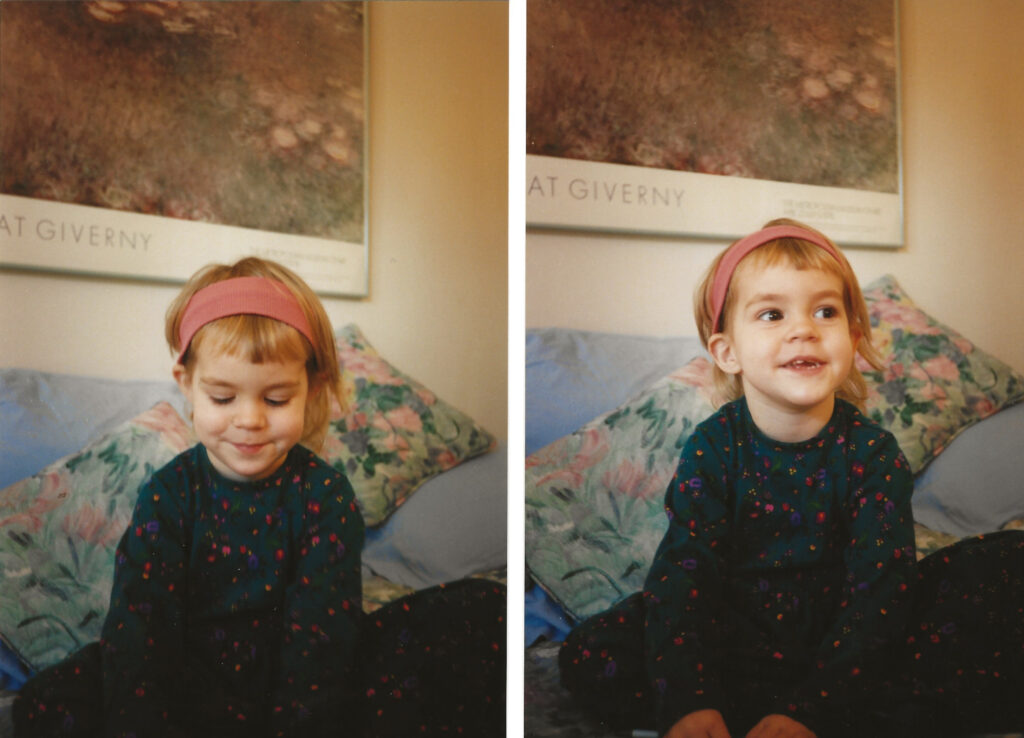
I was a painfully shy kid. Like, so shy I didn’t speak to my aunts or uncles or piano teacher or most of the kids at my preschool, shy. But when I was at home with my parents and brother, or at my best friend’s house, I was loud and happy and boisterous, and when I started elementary school, that confidence started spilling over. That confidence and conviction became my identity from a strikingly young age, growing into a type of self-determination as I navigated playgrounds and classrooms and Sunday school and school busses. And even while I was also developing a host of anxieties about anything ranging from thunderstorms to going to the dentist to spending the night away from home—I tried to stand up for myself. If my friend Corinne said something that was mean, I held my ground. If my school friends wanted to play a game I didn’t like at recess, I would do my own thing.
The summer before I turned 11, I was sick almost every day with gastrointestinal problems—the beginnings of dysautonomia for me. The first week back at school, my dad lost his job. I took all of this heartache head on and made an appointment for myself with the guidance counselor to talk. I decided I was going to make things OK.
I knew I always had my parents as my safety net, but from the age of 10, I wanted to self-advocate.
So I did.
*
“But how?”
Our world loves to say platitudes like, “let’s take the stigma out of mental health!” (Also, calling it “mental health” is just another sign of mental illness being too stigmatized. Call it what it is.)
But I agree—we absolutely need to take the stigma out of mental illness/mental unwellness/mental opposite of well-being. I want to live in a world where it’s no different to say “I get panic attacks” than it is to say “I get kidney stones.” (However I’d forever rather hear about your panic attacks than I would what happens in your kidneys.)
For the most part, we’re getting there. Slowly, but surely. But as usual, the work of destigmatizing is always falling on the shoulders of the stigmatized. (I cannot emphasize enough my privilege here. The unpaid labor of social progress almost exclusively falls on the shoulders of BIPOC women—nearly all positive social change is the result of women of color who did it for free and without recognition.)
I have been trying to contribute to this process of destigmatization since I was 10 and told my friends at our elementary school lunch table that I was diagnosed with depression. “But how?” they asked. “You’re so happy!” I wanted to open up, and make it normal, because I was still normal. And if we talked about it, it would also make it OK.
A year later they stopped asking “But how?” when they heard me hysterically screaming and crying in my mom’s car because I was in a spiral and couldn’t calm down. Instead Mallory wrote “we heard u” over AIM and I took that opportunity to tell her that, yeah, that’s how bad it gets. But I’m still the same person.
As I grew into a teenager, I would edit my story. I was OK telling everyone that I had anxiety—I felt it was blatantly obvious and no use hiding it. But I hid the depression. I could still trick people into thinking, “But how?”
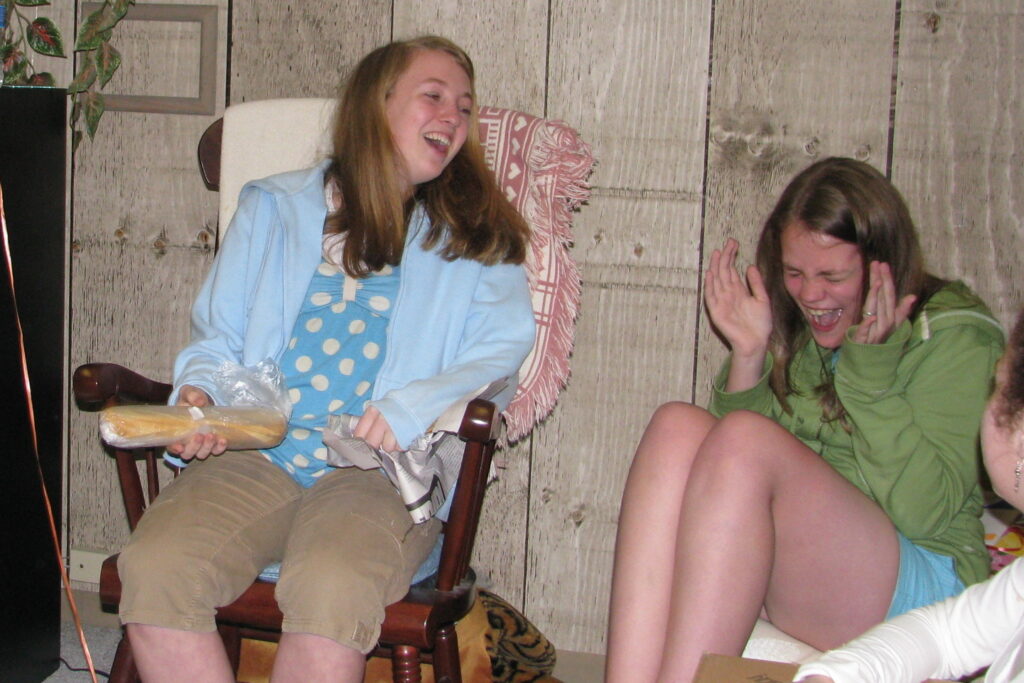
the look of the depressed girl that inspired, “But how?”
When I identified other depressed people, other safe people, I opened up and let them in, we compared our medications, talked about our therapists, shared the confessions of the things we told ourselves in dark rooms.
Once I hit my 20s I was brave enough to tell everyone everything. (Or maybe I was just too tired of keeping things hidden.) I have written ad nauseam about TMS (transcranial magnetic stimulation), about what it’s like having to drop out of college not because your grades are bad but because you’re literally too depressed to function, I’ve shared how I originally opted to have ECT (electroconvulsive/electroshock therapy) but was denied because of dysautonomia, and how it nearly destroyed me, and I do it because I have received messages saying “this helped me feel less alone.”
I will continue to do this until someone tells me otherwise.
I will advocate for myself and I will do the work of destigmatizing, because I know there are shy girls and brave girls and crying girls out there trying to figure out how the hell to answer “But how?” to inquiring minds.
*
We can debate for centuries about the “right” way to solve the looming mental health crisis.
But equally as pressing, we need to solve the crisis of the mentally ill being exploited for political gains.
Those of us with anxiety, depression, ADHD, OCD, PTSD, bipolar disorder, schizophrenia, what have you—are thrown around like rag dolls and tossed to the side, twisted, and contorted to fit whatever narrative the latest think tank or lobby or congressman is pushing this week.
*
Facemasks are killing the children.
During COVID, I watched the political party who made it harder to exist as a person with depression start weaponizing mental unwellness so that we could restore the economy, get back to work, and take off our masks—which would only endanger disabled and high risk people—of which I am one—of which having depression makes you one. Of which contracting Long Covid will make you one.
I am not trying to write off the very, very real link between COVID isolation and depression, anxiety, suicide spikes. I can read a graph, and I’m also a human, so I am capable of empathy, and I hear people when they tell me, I am struggling. Because I’m struggling, too. This pandemic has been hell.
But what I am 100% not OK with, is politicians using mental illness as a way to get what they want after years of actively working against the best interest of the mentally ill in a comically villainous manner. If they had a change of heart and are now on the mental health train, awesome, come on board, but this is a lifelong commitment, not a one time vote.
(And for the record, there is zero evidence that wearing a mask will harm a child or cause them anxiety. There is, however, evidence it will help keep them from contracting illnesses that will kill them.)
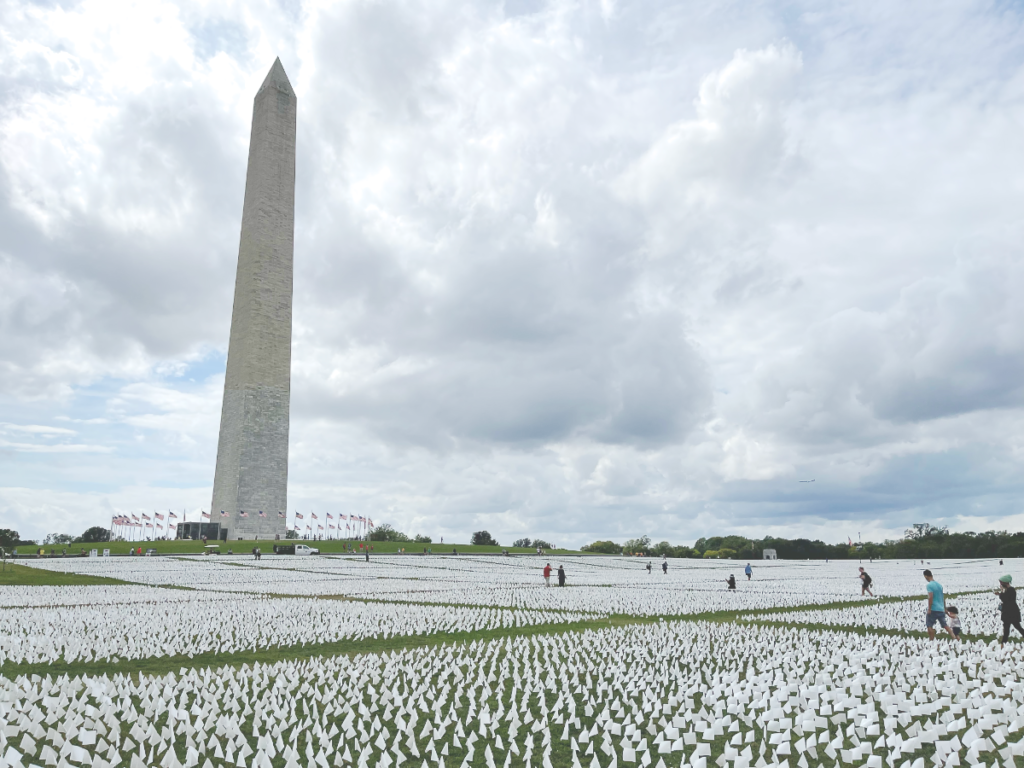
In America: Remember exhibit on The National Mall in September 2021. Small, white flags were displayed, 1 for every person in the United States who died of COVID. On the day I visited, 676,286 flags were in the ground.
It’s not an isolated incident.
Mental illness, while we herald it as something we need to destigmatize and make normal, is society’s scapegoat.
You know how I know? I had POTS for ten years and every single doctor wrote it off and told me all of my symptoms were depression. (Tachycardia upon standing and while exercising was a symptom of depression?) A psychiatrist had to be the one to tell me my autonomic nervous system didn’t function correctly and there was no amount of SSRI or anti-psychotic he could prescribe to fix that mess.
Our society is preordained to blame mental illness for every wrong, every bad thing, because it’s the easy thing to do. It doesn’t require us to actually examine what’s wrong and question our own moral responsibility for fixing what’s at hand.
Kid with bad grades? He’s depressed.
Girl gets sick when she eats? She has an eating disorder.
School shooting? He’s a psycho.
Anytime something goes wrong,
We need to fix the mental health in this country!
Yes, there is very much a mental health crisis in this country—believe me, you don’t get prescribed electroshock therapy at 21 without being aware of a mental health crisis—but we can’t blame every single one of society’s maladies on mental health and pretend our Fairy God Therapist will fly in and fix them.
Some things are very much mental health crises and some things, are not.
We have to be discerning enough to know which is which, and honest enough to name the differences.
And then we have to actually do something to fix all of those issues.
I grew up in the NRA’s shadow.
The NRA headquarters is a big glass building looming over I-66 in Fairfax, Virginia. 1.5 miles down the road from it is Waples Mill Elementary School—the very place where I first learned what self advocacy was.
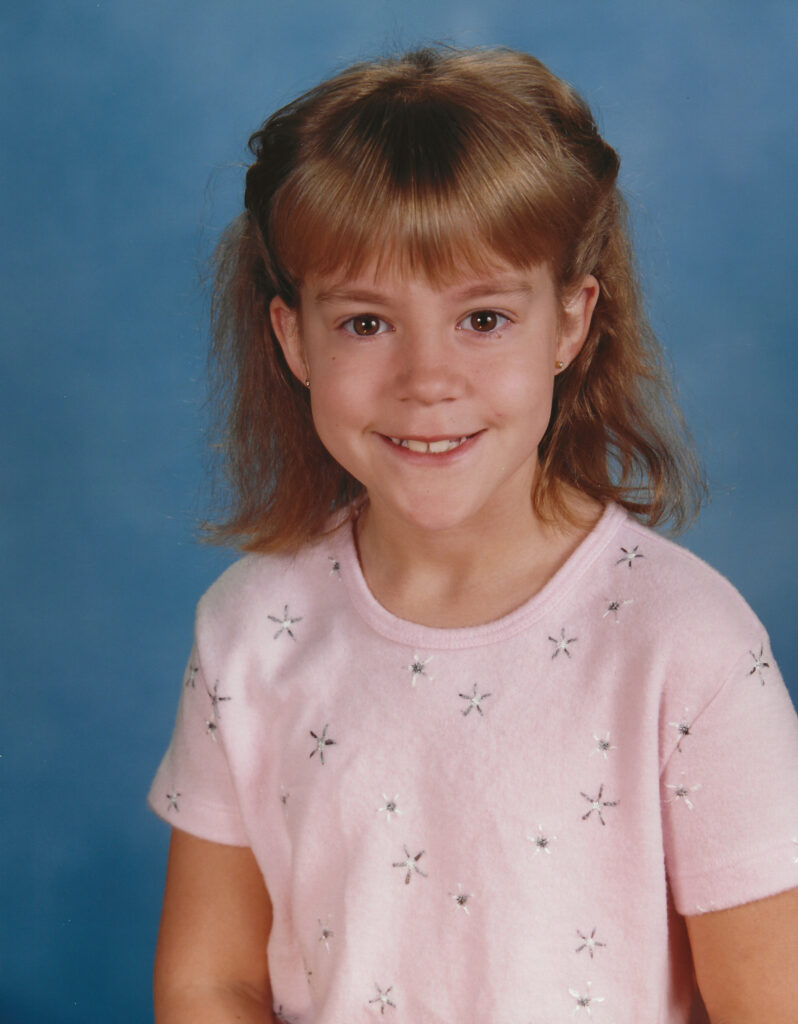
The NRA and the people they finance love to peddle the line that gun violence is not due to guns, but due to “lunatics,” and people with “mental health challenges.”
The NRA and its spokespeople would like you to believe that people on “psychotropic medications” and “seeing mental health professionals” are “evil monsters” to look out for.
The NRA and the presidents they elect would like you to think that “mental illness and hatred pull the trigger, not the gun.”
The NRA and the people they finance would like you to believe that fixing mental health is the “critical ingredient” to gun reform.
As someone with a mental illness, I am far more likely to be a victim of gun violence, not a perpetrator.
Mental illness does not have a strong relationship to mass shootings.
There is, however, an undeniable link between domestic violence and mass shootings.
I’m different now.
I used to believe that maybe there was a way to bridge the gap between responsible gun owners and gun control laws to keep us safe.
I have given up. I no longer believe a solution out there exists.
I’m a part of the School Shooting Generation. I was six-years-old when Columbine happened. I stood in front of the television in my parents’ room and watched “big kids” run out of a high school with hands on their heads. The footage was replayed every night for weeks. Little did I know, this would become a regular occurrence throughout my life. Only eight years later, I would sit at my computer watching Virginia Tech unravel while checking MySpace and Facebook to see if my friends’ big brothers and sisters were safe.
It’s easier to get a gun than it is to get a driver’s license or an abortion.
What the hell is this all for?
The NRA would rather spend obscene amounts of money lobbying so they can keep their guns, their money, their lifestyles—all while mass shootings take place—because remember, they want you to believe that mentally ill people like me are to blame for this problem, despite no scientific evidence to support this claim.
I only see one solution, which is banning every gun, ever. Is that realistic? No. But at the very least, I think we need to follow in the steps of New Zealand and ban semi-automatic rifles.
I’m empathetic to the fact that this means that there are some responsible people who have to give up a hobby and a passion they love. But if giving up one of my favorite things to do—like reading or going to Target or scrolling TikTok mindlessly for hours—meant I could save the lives of innocent people—I would have to do it. How could I be OK with myself not doing it?
I’m so far past caring about the Second Amendment. You can talk my ear off all day about the sanctity of the Constitution and how much you love that legal document (honestly a weird flex), and how nullifying one amendment will ruin the rest of them, and I’ll remind you we have done it before because it’s a living document and the Framers built it explicitly so it can grow and change as we do. Also, the Framers never saw an AR-15. Enlighten me how an AR-15 is an inalienable right.
*
Guns are the leading cause of death among American children and teens.
Black children are four times as likely to be killed with guns than white children.
Having a gun in your home does not make you safer.
A good guy with a gun does not stop a bad guy with a gun.
*
Where do I go from here?
I know very well how to self-advocate. I am well-versed at it. But I’m still learning how to be an advocate for others, on a micro and macro level.
And how does anyone advocate for others against these forces? Against lobbies and politicians manipulating our struggles to be 1,000 times greater? Governor Greg Abbott cut $211 million for mental health funding in Texas last month, and then blamed the Uvalde shooting on mental illness, despite there being no evidence for that. How do I fight against this?
Like most people, I feel lost. I feel furious. I feel like Sisyphus. I’ve been losing sleep and crying watching the parents of Uvalde clutch photos of their children, while remembering—the Buffalo shooting was only two weeks ago.
How do we fix this?
How do I stand up for this when I am spiraling into despair?
How do I make the world safer for the people I love, particularly my little cousins who are in school?
*
In the coming days, people a million times smarter than me will come forward with solutions. At that time, we can start passing those solutions on to our elected representatives. We can give money where it’s needed to fund those solutions.
But if there’s one thing I can use my voice for, it’s repeating this message until everyone understands it:
The United States’ gun violence crisis is not due to its mental health crisis, they are merely concurrent with each other.
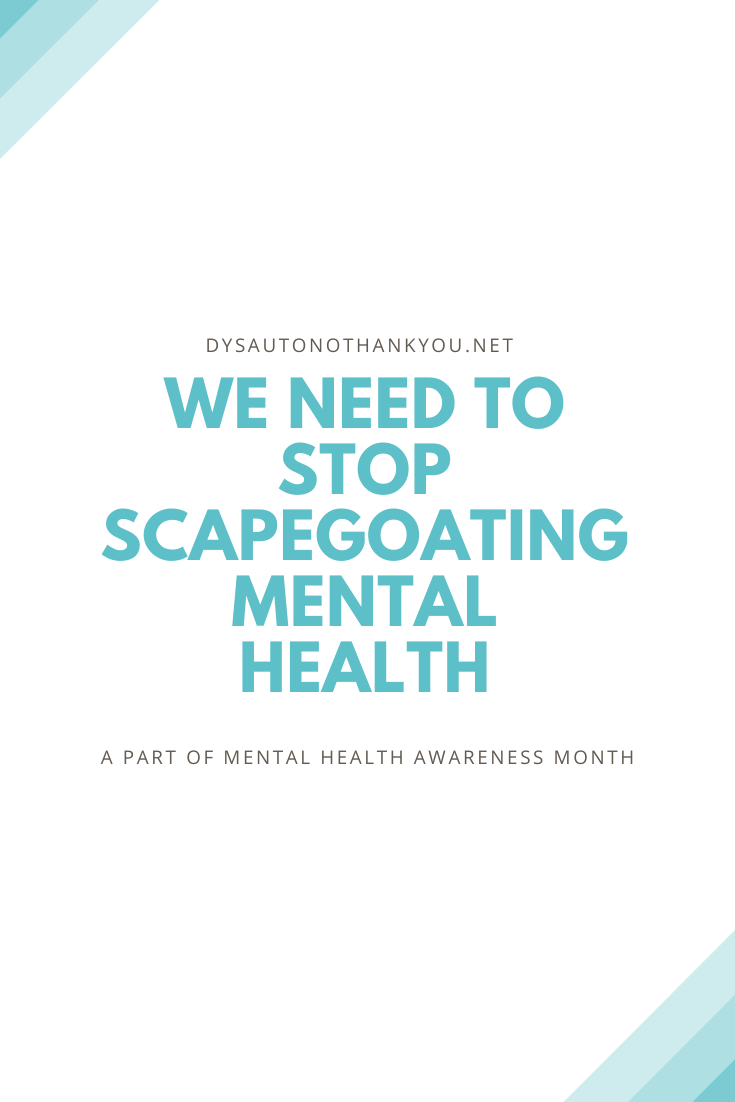
My wise friend. Thank you for digging deep. Keep going Shannon!